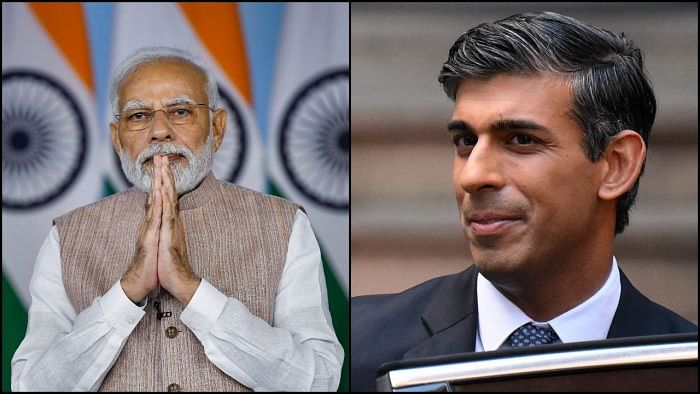
India and the United Kingdom are likely to restart talks about Prime Minister Narendra Modi’s proposed visit to London where Rishi Sunak has been appointed as his new counterpart on Tuesday.
Soon after Sunak took over as the United Kingdom’s first Hindu Prime Minister with ancestral roots in pre-Partition undivided India, British Foreign Secretary, James Cleverly, called up his counterpart in New Delhi, External Affairs Minister S Jaishankar, and discussed “bilateral relations”.
Cleverly retained the foreign portfolio even as Sunak reshuffled the cabinet after succeeding Liz Truss, who quit after a less-than-two-month-long stint at 10 Downing Street in London.
Also Read | Modi congratulates Sunak, conveys 'special diwali' wishes to 'living bridge' Indians in UK
New Delhi and London have been discussing a proposal for a visit by the Prime Minister of India to the UK. Though the two sides had earlier discussed a proposal for Modi to join Truss in London this month to witness the signing of the India-UK trade agreement, the plan was shelved as the negotiators did not appear to be close to meeting the Diwali (October 24) deadline to finalise the deal.
The deadline had been set by Modi and his then counterpart Boris Johnson during a summit in New Delhi earlier this year.
The two sides had also briefly discussed a proposal for Modi and Truss meeting in London in early November and announcing a broad framework of the trade agreement, leaving the specifics to be decided later.
But even the discussion on the proposal for Modi’s visit to London to announce a framework deal without specifics fizzled out as uncertainty loomed large over the fate of Truss as British Prime Minister.
However, with Sunak replacing Truss, India and the UK again appeared to be ready to discuss the proposal for a visit by Modi to London at an early date, according to the sources in New Delhi.
“Received a call from UK Foreign Secretary @JamesCleverly. Discussed counter-terrorism, bilateral relations and the Ukraine conflict,” Jaishankar tweeted after his phone call with Cleverly. He, however, did not specify the bilateral issues discussed during the phone call.
Cleverly retweeted the post by Jaishankar.
The External Affairs Minister and the British Foreign Secretary had earlier spoken to each other over the phone on October 14 and discussed ways to add momentum to the efforts to end the impasse in negotiations for the India-UK trade deal.
The negotiations for the trade deal had come under a shadow after Truss’s Home Secretary Suella Braverman had expressed “concerns” and “reservation” over the possibility of the proposed agreement opening up doors for increased immigration from India to the UK.
New Delhi had conveyed to London its displeasure over her remarks.
Braverman had stepped down as the Home Secretary just a few days before Truss had announced her resignation. Sunak, however, brought her back as his Home Secretary on Tuesday.
While congratulating Sunak on Monday, Modi referred to the India-UK Roadmap 2030, which he and Johnson had agreed upon during a virtual summit in May 2021. The India-UK Free Trade Agreement had been included as a key milestone in the Roadmap 2030. It had referred to the 1.6 million strong Indian diaspora in the UK as the “living, thriving bridge” between the two countries.
The Roadmap 2030 noted that people-to-people contact provided strength and durability to the bilateral partnership between India and the UK.
New Delhi has been demanding that the proposed trade agreement should lead to the UK liberalizing its visa regime to facilitate the migration of skilled professionals from India.
The India-UK comprehensive Migration and Mobility Partnership (MMP) was signed in May 2021, in order to facilitate the legal movement of students and professionals, and combat illegal migration and organised immigration crime.
London’s opposition to data localisation requirements of India and its demand for New Delhi to allow companies based in the UK to bid for government contracts in India had also contributed to the impasse in the negotiations for the trade deal. What had also led to a gridlock in negotiations is India’s insistence on greater market access in the UK for its companies offering services, particularly in the Information Technology and healthcare sectors.
New Delhi had made it clear that it could commit to lowering the tariff on whiskey exported to India only when London would accept its demand for concession for its services industry. The UK also demanded market access for its legal and accounting services companies in India.
